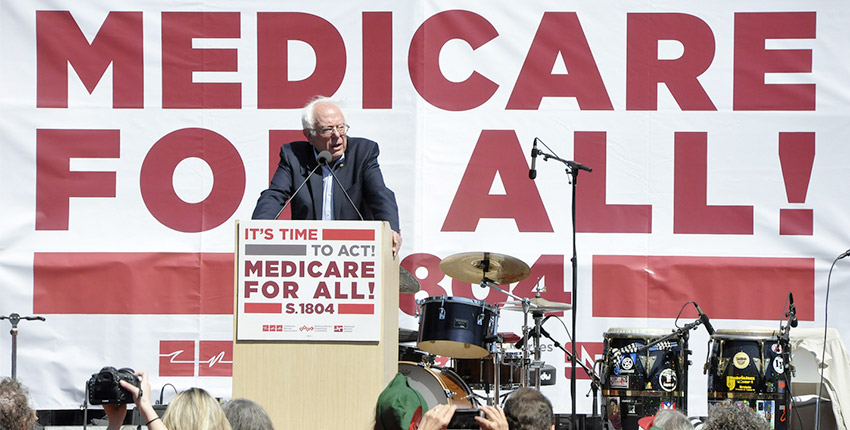Questions & Answers
As a matter of fact, 70% of people support Medicare for All, with 85% of Democrats, 60% of Independents, and 52% of Republicans in favor of the concept, according the latest Reuters poll. Additionally, 77% of the 2018 voting public rate health care as their top issue as they go to vote.
Not true. Even a study conducted by the Mercatus Center, a conservative think tank, concluded that the U.S. would save $2 trillion over a ten year period by guaranteeing health care for everyone with Medicare for All. The United States spends 2.5 times the average of other industrialized countries, or an average of $11,193 per person annually, yet we don’t provide health care to everyone. Health outcomes such as infant mortality and longevity, and equality of access, are much better in other countries.
Medicare is a popular, comprehensive health care program which has been in existence for 53 years. It needs improvements, such as adding dental and vision, plus the ability to negotiate fair prices for drugs. MFA would expand upon the current Medicare model to provide health care to everyone, from birth to death. In 2017 the regulations of the ACA allowed states to implement programs better than ACA-mandated services.
Yes, but even with the tax increase proposed by legislators, 95% of tax-payers will pay less than they do now. The taxes would replace premiums, co-pays, and deductibles. For example, it is estimated a family of four making $50,000 per year would save $5,000 overall by paying the tax increase proposed under Senator Bernie Sanders’ plan.
A recent Commonwealth Fund study revealed that, under our current system of private insurance, 44% of insured adults reported not getting care because of high co-pays and deductibles. Sixty-five percent of personal bankruptcies are due to medical debt, and 75% of those were actually insured.
Myths vs Facts
FACT: Universal coverage does not guarantee care. “Access” is not care. Any system that leaves insurance companies as a middleman to profit off our health and deny care does not guarantee healthcare.
FACT: A majority of people support a “single-payer’ National health plan, a number that increases when the policy is described as “Medicare for ALL,” climbing to over 60% in some polls. In California, for example, even after arguments describing the possibility of tax increases, 58% supported single-payer. Nationally, in the past year, polls from KFF, Politico, Reuters, and YouGov have shown more than half of individuals support Medicare for ALL, including two-thirds or more of Democrats, and a majority of independents. After the last presidential election, a Gallup poll showed 52% of Trump voters who earn under $30,000/year supported a federal guarantee of health care for all.
FACT:
-
- Medicare for ALL would transform a complex, profit-driven marketplace into a simple,
efficient system beholden only to the people. - Warren Buffet: “Healthcare is the tapeworm of American competitiveness… and single payer is the solution.”
- Medicare for ALL will save companies money, get employers out of the healthcare business,
free up capital for investment, and encourage entrepreneurship. - Medicare for ALL is the best way to provide economic and health security in the emerging “gig economy.”
- Medicare for ALL provides funding for transitioning employees from health insurance sales, marketing, and administration to more productive professions.
- Medicare for ALL would transform a complex, profit-driven marketplace into a simple,
Medicare for ALL is good for business and will give the U.S. a competitive advantage.
FACT:
- The fundamental problem in our healthcare system is complexity, which is easily exploited by for-profit insurers.
- An incrementalist, “whack-a-mole” approach won’t save money and leaves in place the root of the problem — a wasteful, profit-based, healthcare system that does not cover everyone.
- Many countries have successfully transitioned to a similar system.
FACT: The single most effective cost containment strategy is implementing a single-payer system
that would:
- Reduce administration costs by 18%.
- Empower the U.S. to negotiate provider and pharmaceutical prices.
- Eliminate U.S. contributions to insurance company profits and executive compensation.
We Are Building A Grassroots Movement to Replace Private Health Insurance With Expanded and Improved Medicare For All
The Affordable Care Act (ACA) made history by expanding health insurance to millions of people for the first time. However, it left for-profit insurance companies involved in our health care system. For instance, even with the ACA, 30 million people are without coverage and 41 million are considered underinsured.


